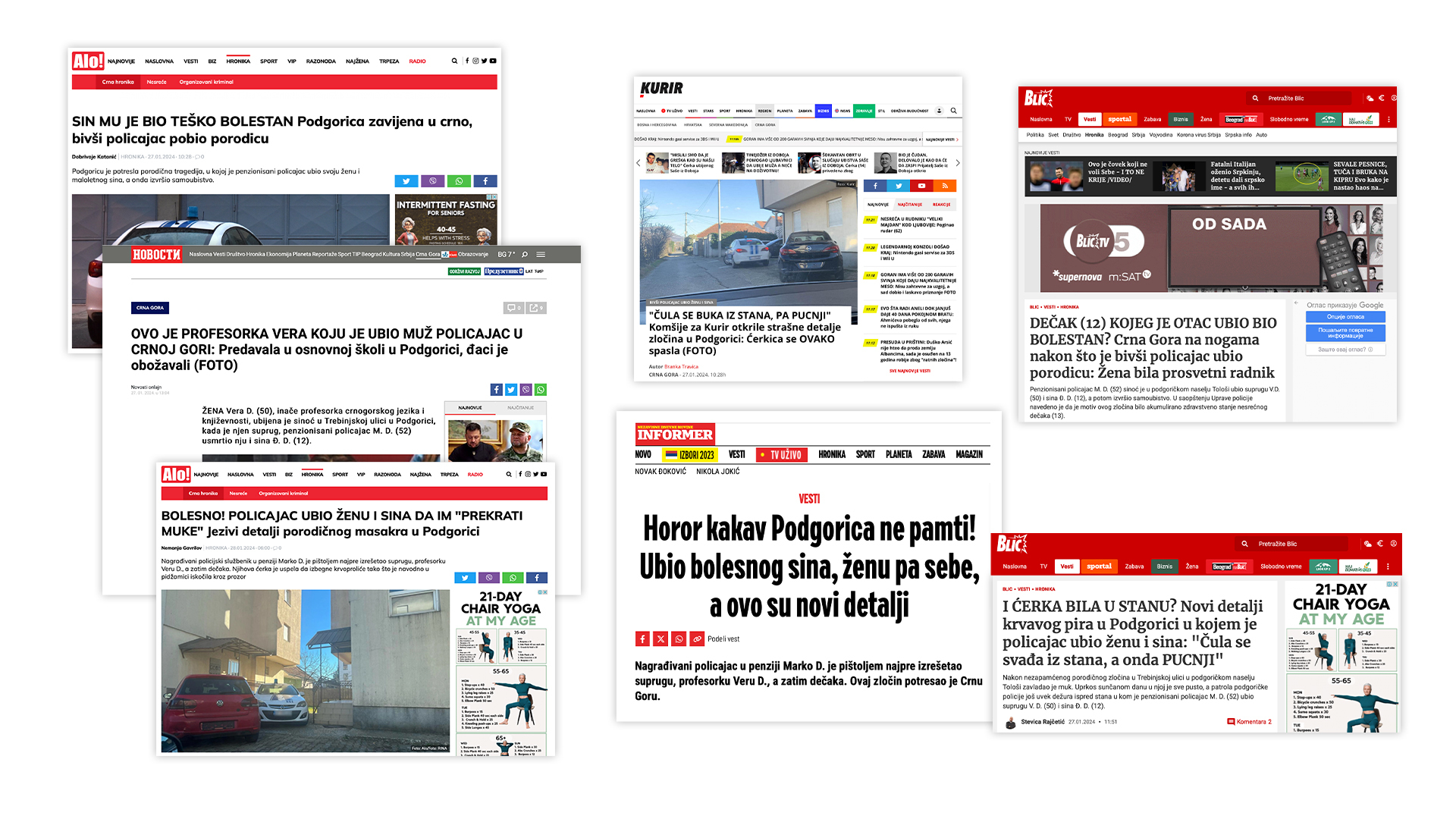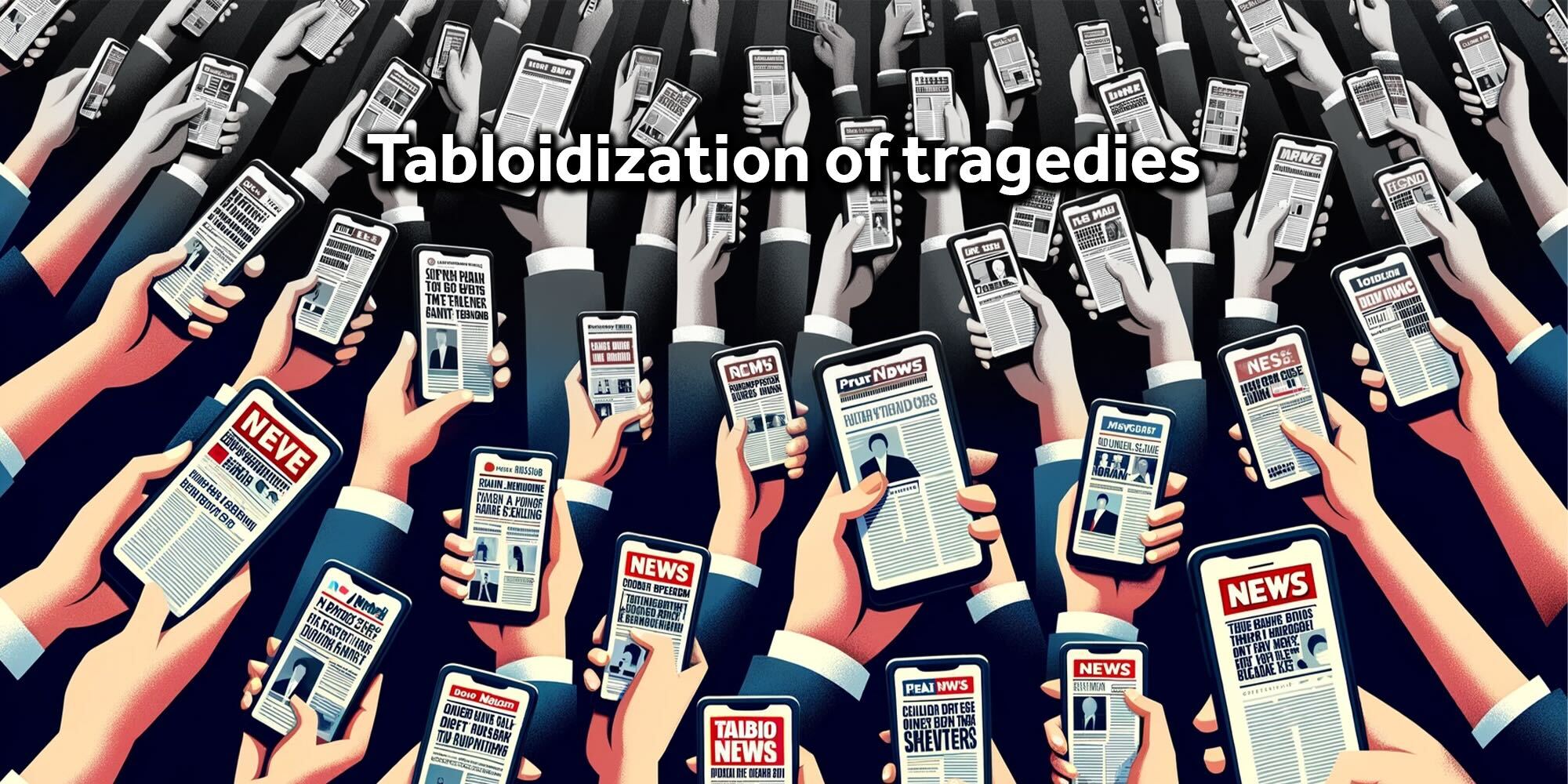On 26 January 2023, in Podgorica, a family tragedy occurred when a retired police officer killed his wife and son before committing suicide. Most media outlets in Montenegro promptly and objectively reported on this incident, conveying official statements of the relevant authorities. However, this incident once again demonstrated the absence of basic empathy and impartiality in certain Serbian media outlets regarding such sensitive topics. The sensationalization and reality-show treatment of human tragedies happening in the region is ubiquitous in Serbian media on daily basis, despite the fact that such practices violate the ethical code and standards of the journalistic profession.
Instead of objective and informative reporting, Serbian tabloids emphasize emotional stories, focusing on the suffering of victims and their families, with the aim of evoking a strong emotional reaction from the audience. Serbian tabloids are known for their sensationalistic headlines designed to attract the attention of a large readership, sometimes at the expense of accuracy or balanced information. This indicates that journalists are exclusively focused on clicks and views for financial gain, without considering the consequences of their reporting.
Sensationalistic and clickbait headlines fill the pages of crime column in both print and online media in Serbia on a daily basis. Taking into account the significant readership and viewership of Serbian media in Montenegro, the DFC has analysed their coverage of the recent family tragedy that occurred in Podgorica. The reports of the Serbian tabloids on the tragic event included information related to the details of the murders – pictures of the street and the house where the murder and suicide occurred, as well as details about the victims and the family members, their professional engagements, illnesses, and family relationships.

The information reported by the Serbian tabloids Alo, Blic, Novosti, Kurir, and Informer was almost unavailable in the media in Montenegro. However, some portals in Montenegro, like Borba, portal 083, and pogled.me, did publish information about the man who killed his wife and son before committing suicide, revealing him as a security officer of the former Chief Special Prosecutor Milovije Katnić. Even though it is a family tragedy which involves pain and suffering, some media outlets saw it as an opportunity to improve their readership by prioritizing sensationalism in their reporting. Additionally, the need for journalists dealing with such sensitive topics to have sensitivity, courage, and professional ethics while working for the public interest seems to be neglected.
The Serbian tabloids reported similarly on the tragedy that occurred in Cetinje on August 12, 2022, where twelve people lost their lives, and six were injured. The Serbian media selectively presented the facts, emphasizing information that supported certain narratives meant to provoke a stronger public reaction and, consequently, increase readership and viewership. Information that did not confirm their theses and narratives was tendentiously omitted. During that incident, an emotional style of reporting was evident, which can be particularly dangerous in such situations. Due to the inappropriate reporting on the mass murder in Cetinje, by the decree of the Council of the Agency for Electronic Media, the broadcast of the Morning Programme of Pink Television from Serbia was prohibited from airing for a period of six months.
The mentioned examples indicate that media coverage of such tragic events, in the most narrow-minded manner, reflects a loss of balance in understanding tragedies and societal relationships. The practice of tabloid and sensationalistic reporting on tragic events is often justified with the argument that “people like to read that”. It is important to emphasize that such reporting is not punishable in most cases, and society often does not ask for accountability. The low level of media literacy, unregulated legislation, and the polarisation and discontent of society creates a fertile ground for the media to disseminate content filled with narratives, unchecked information, and sensationalism. This is a problem that affects society in general, and it is thus necessary for the relevant ministries and institutions, media, and non-governmental organisations to be involved in the process of addressing this issue. It is essential to educate citizens through the synergy of all these entities and make them aware that such reporting can have far-reaching consequences.

